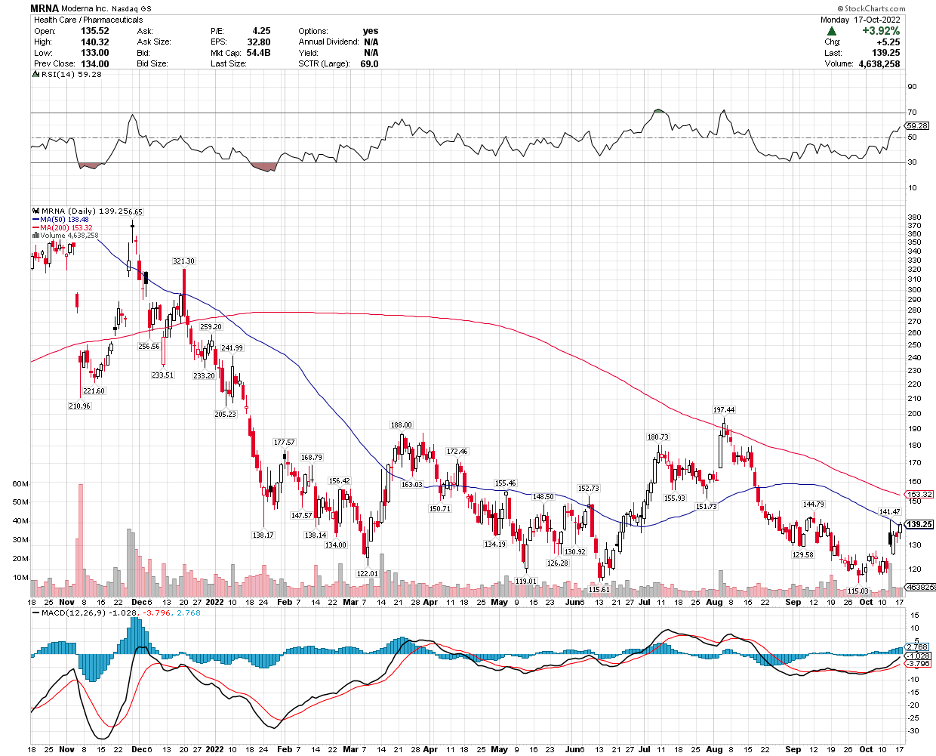Just What The Doctor Ordered
A newly announced collaboration extension with Merck (MRK) might just be what the doctor ordered for Moderna’s stock, which has been experiencing a decline in revenue since the public started resisting boosters.
Moderna stock rose 12% following the news that the FDA approved its collaboration deal with Merck as well as its COVID booster geared towards young kids.
Those positive updates most likely mark the end of a falling knives stage for the company, as it was coming off a 52-week low just days before the announcements.
The deal between Moderna and Merck involves a personalized cancer vaccine, which the two have been working on since 2016. The goal is to use Moderna’s technology as a combo treatment alongside Merck’s mega-blockbuster Keytruda.
The cancer vaccine, currently dubbed mRNA-4157, will be tailored for every patient. It generates a reaction according to the particular mutational signature of an individual’s tumor.
The collaboration is already in its Phase 2 trial for a high-risk melanoma vaccine.
The deal involves Merck shelling out $250 million in cash to exercise its option on this personalized cancer vaccine candidate. Had Moderna not earned copious amounts of cash over its COVID-19 vaccine over the past two years, this money would have seemed like a much bigger deal.
Nevertheless, the agreement is for a 50-50 sharing of costs and, eventually, potential profits. The results of Phase 2 should be disclosed to the public before December 2022.
Regarding how this affects Moderna’s pipeline, the collaboration demonstrates the versatility of the mRNA technology.
The other update that boosted the stock is the emergency use authorization granted to Moderna and fellow COVID-19 vaccine maker Pfizer (PFE), which allowed their boosters to be used on children.
As you know, Moderna markets and sells only a single product: SpikeVax. While this COVID vaccine is, apart from Pfizer’s Comirnaty, the most extensively used worldwide, pushing revenues to $18.5 billion in 2021, and is on track to hit roughly $21 billion in 2022, sales for SpikeVax are expected to decline now that the pandemic has been deemed “over.”
The company’s agreement to 70 million vaccine doses to the US government, on top of the option to purchase up to 230 million, which will be worth about $4.8 billion at $16 per dose, may very well be Moderna’s last to a government.
Currently, the biotech is looking into the private market, in which its vaccine may start costing up to $100.
Reviewing the demand and the current situation, my best estimate is that Moderna would earn roughly $7 billion annually from the private market for its COVID vaccine.
Nevertheless, Moderna’s vaccine has shown proof of concept. This would translate to more confidence in the company’s pipeline. Its expanded collaboration with Merck is a clear indicator of this sentiment.
In terms of the rest of its pipeline, Moderna has several candidates.
The most advanced so far are its Phase 3 programs for a flu vaccine, a respiratory syncytial virus vaccine (RSV), and a cytomegalovirus vaccine (CMV).
Considering the respiratory nature and the resounding success of its mRNA COVID vaccines, it’s reasonable to believe that the Phase 3 trials for these candidates would also be successful.
Hence, Moderna could be looking at substantial revenues once these vaccines enter the market.
While it can be argued that flu vaccines already exist, sometimes being the first to market is insufficient to keep a significant market share.
The current flu market is estimated to be worth $5 billion to $6 billion, and there are definitely a lot of competitors in the sector.
However, Moderna aims to develop a more efficacious vaccine. Needless to say, that could easily command a higher price tag and attract more customers.
Meanwhile, Moderna’s RSV vaccine—if approved—would not have any rivals. This is also another massive segment, with the market for the older adult population alone already worth $10 billion.
Both RSV and flu vaccines are anticipated to be released by late 2024 or early 2025.
When people hear Moderna, they immediately think COVID stock. Then, they immediately begin to wonder about the company’s future. Basically, Moderna has become a victim of its own success.
At the moment, the market is focused on Moderna’s potential revenue loss from its COVID vaccine. That sentiment is clearly weighing on the company’s price, making it undervalued. However, these very same fears make Moderna a steal considering the company’s long-term prospects well beyond its COVID program.
Long-term investors would see this as an opportunity to buy an innovative biotech for a bargain and reap the rewards when Moderna’s other candidates start to gain momentum.

